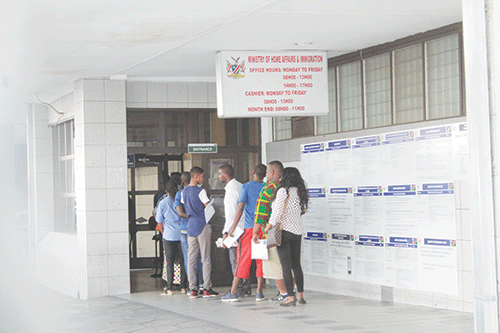During the 2021/22 financial year, the Public Service Commission (PSC) recorded 91 cases of misconduct, of which 76 cases (84%) were processed while 15 cases (16%) were carried over to the following financial year.
This is according to the PSC’s 2021/22 annual report, which was tabled in the National Assembly for scrutiny on Tuesday.
The commission found that the ministry of home affairs was faced with concerns over fraud and unauthorised issuance of national documents, which some staff members conducted without adherence to regulations.
This, according to the commission, is out of control. “This has the serious effect of compromising State security and international good standing of the country and government. The temptation exists at the Ministry of Home Affairs, Immigration, Safety and Security for some staff members to collude with criminals and or illegal immigrants to obtain national documents in exchange for a fee,” the commission noted.
The commission further noted trends of theft within public offices.
These include embezzlement, misuse of State property and fraud, gross negligence as well as repeated unauthorised and/or non-communicated absenteeism. “The commission recommended the suspension of one case of a staff member who was allegedly involved in unlawful practices by selling national documents. It [PSC] resolved not to recommend for the other case due to lack of convincing reasons to suspend the staff member,” reads the report.
Bribes
Meanwhile, misconduct, solicitation and bribery emerged as glaring issues within the finance ministry, with staff members alleged to have accepted or solicited bribes in the execution of their duties.
“These behaviour are construed as corrupt and have the effect of compromising proper adherence to established norms and systems in the ministry and the public service,” indicates the report.
Numbers
Topping the list of cases registered was the health ministry with 16, followed by education with 13 cases.
Both the ministries of home affairs and finance reported four cases.
“In 84% of the cases, the commission recommended disciplinary committee (DC) recommendations. In 13% of the cases, the commission changed the DC recommendations to discharge/dismissals to be consistent with similar transgressions,” reads part of the report. In only 3% of cases presented to it, the commission recommended withdrawals of misconduct cases due to non-adherence to the provisions of the Public Service Act. From the ministry of health, the commission received a request to suspend a staff member who was incarcerated, reasoning that he may interfere or tamper with evidence.
However, the commission resolved not to recommend a suspension because it was unlikely for the staff member to interfere or tamper with evidence as a staff member was not granted bail. During the reporting period, the commission also received five cases, of which two were for the termination of probation while the remaining three were for the extension of the same.
Reasons for termination/extension of probationary period include absenteeism, falsification of documents, false statements when applying for employment or the staff member was rated below average, and assessment was not done timeously.
The education ministry was not exempted from scrutiny, as the report exposed a “disturbing” pattern of teachers engaging in sexual relationships with learners, which poses a severe threat to the education system and the future of these young students.
Root causes
The PSC also delved into the root causes behind these matters, identifying multiple systemic failures.
In the finance ministry, the abuse of positions by taxation officers to defraud the ministry of millions of dollars in tax refunds highlighted a lack of supervision and internal control mechanisms, according to the report, bringing the effectiveness of internal auditing mechanisms into question.
Similarly, in the ministry of home affairs, regional offices were found prone to abuse and corruption due to a lack of supervision and control in the issuance of national documents.
“These issues demand immediate attention and reform,” says the report.
The PSC also recommended that the education ministry enforces the quarterly induction of teachers for behaviour and conduct, accompanied by stern warnings against engaging in any form of sexual relationship with learners.
Challenges
The commission recognised the challenges faced by various offices, ministries, and agencies (OMAs) and regional councils (RCs).
“Challenges faced by the OMAs and RCs in handling misconduct cases include a shortage of personnel in human resource divisions; personnel on board are not trained and equipped to deal with labour matters or disputes and inadequate control mechanism including demoralised staff members,” the PSC found. Furthermore, the PSC said: “Internal audit units in OMAs and RCs are not optimally utilised to detect flaws or systems risks and compromised systems where staff members are expected to preside over the discipline of their colleagues.”


